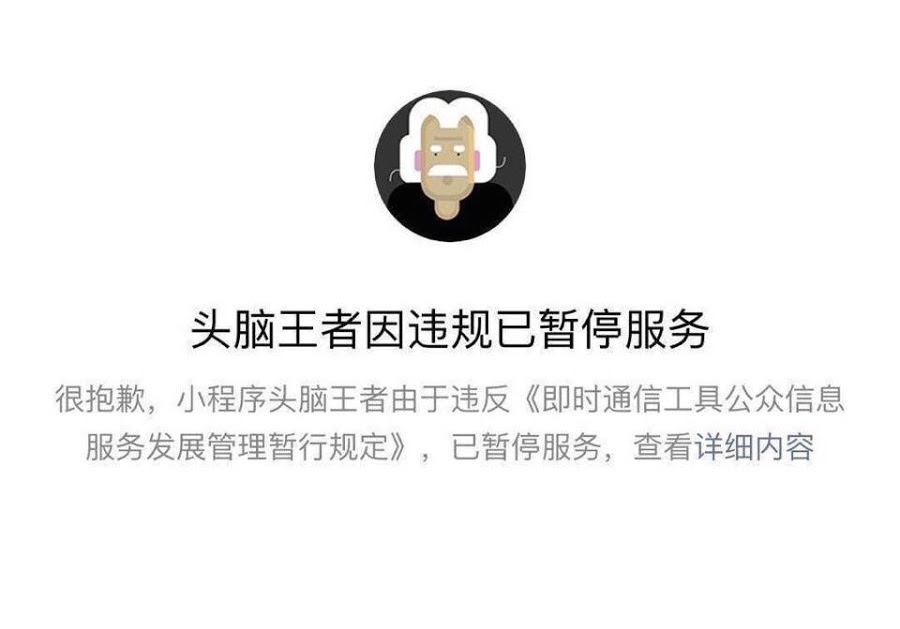Why did a Chinese live trivia game get suspended? A: Jiang Zemin
Why did a Chinese live trivia game get suspended? A: Jiang Zemin

Avid players of Brain King 头脑王者, a live trivia game similar to HQ Trivia that runs on the Wechat platform, were shocked to find their beloved mini-program unavailable yesterday, with a notice saying the game had been suspended for violating WeChat’s rules.
Launched earlier this month, Brain King lets users compete with their friends or random online players over a series of trivia questions. It was created as part of the online quiz craze sweeping the Chinese Internet.
Replying to its suspension, Brain King said it was the result of the mini program’s failure to “examine its questions carefully,” which “brought inconvenience to its players.” The company also said it was in the middle of a self-examination, and promised to thoroughly screen its questions, delete inappropriate content, and stick strictly to relevant regulations in the future.
According to Paper.cn, WeChat told media that the decision was made per request from authorities overseeing internet content.
It’s not the first time that a quiz app has been banned due to inappropriate questions. Earlier this month, Million Winners 百万赢家, a similar trivia game backed by internet security company Qihoo 360, was ordered to conduct an overhaul after internet authorities found that it listed choices of Taiwan and Hong kong as independent countries.
In the case of Brain King, though no official explanations have been given as to which exact questions irritated internet regulators, the game’s players were quick to help it spot its problems. And it should come as no surprise that similar to Million Winners, the questions that put Brain King in hot water are also politics-related, but in a more subtle way.
For example, the question below asks players to identify which famous figure in Chinese history said the classic quote, “For the purpose of the national benefits, everyone is obligated to sacrifice himself rather than escape from the misfortune for his own benefits” (苟利国家生死以,岂因祸福避趋之).
Lin Zexu 林则徐, a 19th-century Chinese official who played a huge role in the First Opium War, is the right answer. But one of the answer choices is Jiang Zemin 江泽民, a former Chinese president who has a cult following among young Chinese because of his unfettered personality. Why is Jiang an answer choice? For that, you have to appreciate moha culture 膜蛤文化, or toad-worship, named after this president’s outwardly “amphibian” features. Jiang, in his post-office days, has actually become a popular target for memes.
For you see, Jiang actually said the above quote during a 2009 visit to China United Engineering Corporation, a trip that is one of the “Three Pieces About Toad” that every “toad worshipper” is familiar with.
The makers of Brain King are, quite apparently, big toad worshippers. Here’s another example, a question that asks “Who changed China?”
Again, the question seems to come out of nowhere, and the choices don’t make much sense either, including “he” 他, “she” 她, “it” 它, and a weird character that reads shé 虵. But for Jiang’s fans, the question is a clear reference to a biography of Jiang written by Robert Lawrence Kuhn. The book’s title is The Man Who Changed China: The Life and Legacy of Jiang Zemin. In addition, the character 虵 shares the same radical as the character for toad, 蛤 (há).
虵 (shé) is, in some ways, sensitive in and of itself; it began to circulate only after internet authorities censored 蛤 (há) last year to prevent the spread of moha culture.










